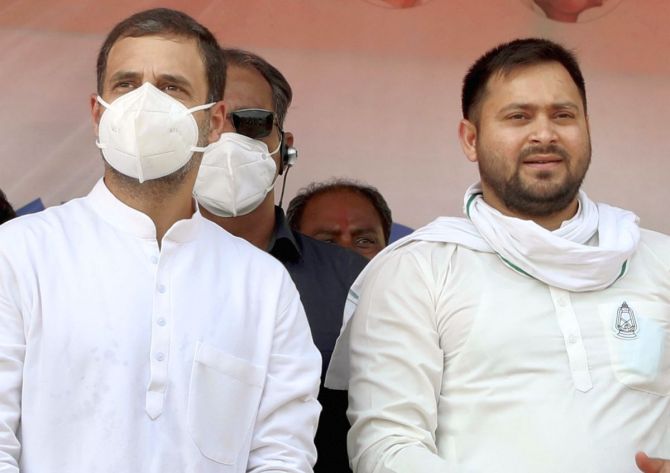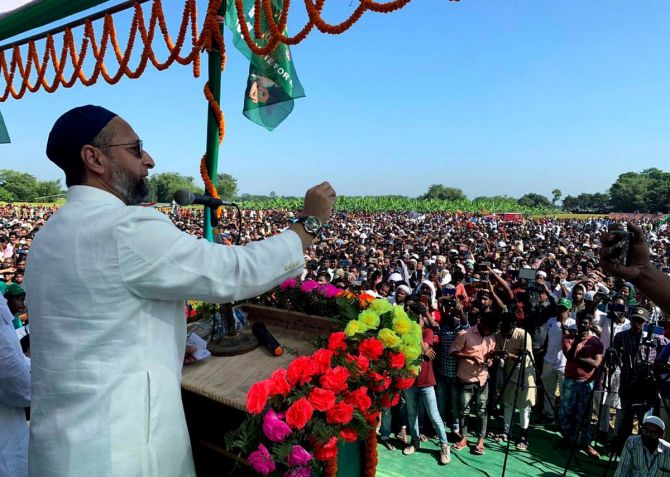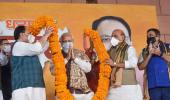Will the M (Muslims) in the RJD's M+Y move fast swiftly towards the MIM and away from the RJD, asks Mohammad Sajjad.

Is the RJD-Congress really prepared to introspect after the Bihar Verdict 2020? Sadly, the answer does not seem to be in affirmative.
In the name of introspection, the Congress seems to be doing only one thing: Put all the blame on Asaduddin Owaisi's MIM. Pity is, even that job is not being done with adequate homework.
Even Congress dissenters appear to be missing the wood for the trees.
These dissidents are raising relevant and larger issues, but many of these issues get into abstraction rather than focus on concrete empirical (seat-wise) diagnosis and course correction.
The RJD, in its first reaction, tried to put all the blame on the Congress, though the RJD didn't insist much on this factor subsequently.
That 35 out of the RJD's 75 MLAs (47%) come from the Yadav community is something the RJD doesn't want to be dissected.
This, despite the fact that a fairly good proportion of young Yadavs are said to be enamoured with the saffron shade of politics.
In my various columns before the election, I wrote that unless the RJD projects non-Yadav 'lower' OBCs and non-Paswan Dalit leaders as its future deputy chief ministerial candidates it would not be able to outsmart the National Democratic Alliance.
That has neither been taken as a forewarning nor are they doing the necessary exercise of diversification now.
At its press conferences during and after the election, the message the RJD is sending out is that it remains a family fiefdom and Muslims continue to be invisibilised.
Akhtar Shaheen -- the senior RJD MLA who has won elections continuously from Samastipur -- is missing from the RJD's exercises of leadership projection.
This, despite the crippling challenge posed by the MIM.
The BJP has appointed two deputy chief ministers keeping in mind sub-regional and caste factors.
Only a naive politician will refuse to see through the BJP's game of propping up these individuals as deputy chief ministers.
The important education portfolio was given away to someone who had to resign within three days of taking the oath, as if the charges against him were not known to the chief minister and his NDA!
Does it mean that the BJP wants to create disgust among the people of Bihar who would get fed up with such tainted ministers, thereby creating the atmospherics and public opinion for the resurgence of the upper castes in the Bihar council of ministers?
Does it foretell that in order to facilitate an upper caste dominated cabinet, the BJP would give Nitish Kumar an honourable exit and easily reclaim and solidify its support among his core support base -- the Kurmis, the Ati Pichhrhas, the Mahadalits?
Thanks to rising saffronisation and growing anti-Muslim hatred, the rising representation of the upper castes at the expense of falling representation of the OBCs no longer generates heartburn.
This Bihar assembly 2020 is said to be seeing a 6% rise in upper caste representation and an 8% fall in OBC representation.
After a Rajput became chief minister in neighbouring Uttar Pradesh, Bihari upper castes are becoming impatient to lead or dominate Bihar's council of ministers.
Assuming that Nitish Kumar will be replaced with an upper caste chief minister in, say two years from now, will Tejashwi be able to rejuvenate himself to mobilise a cross section of social groups in his favour?
It goes without saying that any such transition and transfer of power will be done with communal polarisation via everyday communalism, in order to cover up the transfer of power.
That will make Tejashwi's task much more difficult.
If Nitish is replaced with a Yadav leader (Nityanand Rai or Nandkishor Yadav) then Tejashwi's task would become even more difficult.
In fact, that may put Tejashwi's political career in great trouble.
This is something I raised in a Seminar article (external link) (February 2016) on the Bihar verdict 2015, asking, 'What will happen in the future when the RSS-BJP moves towards propping up backward leaders of some stature as chief ministerial candidates?'
The RJD must realise that Owaisi's MIM will keep mounting pressure on the party.
A Muslim girl was burnt to death allegedly by some Yadav goons in Hajipur in Vaishali district.
Tejashwi, despite being the MLA of a seat from Vaishali district, has not visited the family of the deceased victim yet.
This is what he had done after the lynching of Zainul Abedin Ansari in Sitamarhi in October 2018.
In both cases, MIM leader Akhtarul Iman performed the 'ritual symbolism'.
Iman is a powerful orator in chaste Urdu and is expected to make a big difference in the debates of the current assembly to which he was elected on November 10 after defeating long time Congress MLA Abdul Jalil Mastan.
Will the M (Muslims) in the RJD's M+Y move fast swiftly towards the MIM and away from the RJD?
Already, having seen a complete absence of Muslims from the Nitish cabinet, some pragmatic and politically astute Muslims in Bihar have regretted their decision not to have voted for the Janata Dal-United's 11 Muslim nominees who won a chunk of Ati Pichhrha votes.
They think their numbers could have added to the otherwise weakened Nitish's strength within the NDA.
In Bihar, almost always, an average of 13% of the ministers used to be Muslims.
This time there is none, for the first time.
True, Nitish failed the Muslims in their agitation against the NPR-NRC-CAA.
But so did Tejashwi who did not visit even a single site of such protests, not even the one at Patna's Sabzi Bagh.

After the booth-wise break-up of the votes counted on November 10, Muslims are now able to see through a game that in so many seats -- Mithila, Tirhut, Champaran, Gopalganj... -- the Yadavs preferred Yadav candidates over the RJD-Congress's non-Yadav candidates.
Such revealing electoral fact-sheets are circulating via social media among Muslim youth across Bihar.
Such information adds to the Muslim grievances against the RJD's much touted M+Y, and making Muslims favourably disposed towards the MIM.
Some forward-looking Muslims are trying to argue with young Muslims that the MIM kind of politics may not assure good prospects for Muslim minorities.
The MIM can only elect a few MLAs who will shout inside the assembly, but remain perpetually in Opposition without making much of a difference or impact.
Within the Muslim community, other issues are also being debated: That Owaisi confines his oratory and arguments on the floor of the Lok Sabha and in the media, but stays away from street protests, that he has not come clean on the questions of justice based on caste and gender.
That the MIM, like other caste outfits, is a family enterprise, with no division and delegation of power, not even a spokesperson, from outside the Owaisi family.
Pat come the replies that if various numerically smaller castes can have their own political outfits and can align with bigger parties, why can't the MIM kind of forces be accepted as an ally just as the AIUDF in Assam and the IUML in Kerala are accepted as allies of the Congress party?
These debates among the Muslims need urgent and serious attention, not only from the RJD, Congress, TMC, etc who have been thriving on Muslim votes, but also from secular-democratic minded Indians as a whole.
Muslim votes have been working as a minimum available balance in these parties's accounts upon which they add up other votes.
This made these parties complacent about diversifying their leadership composition.
Tejashwi should be extremely worried about that 'minimum available balance' in his electoral account.
This is something Sanjay Yadav, Tejashwi's political advisor, should be tutoring him about. Last year, Sanjay Yadav had announced his plan of social engineering to take the RJD beyond M+Y and to make it for all -- A to Z.
Practically, as it turns out, they kept Yadav domination in the RJD intact, and this is how non-Yadav OBCs and Dalits continued to reject the RJD.
What about the Congress? In the Bihar elections 2020, in many seats -- Vaishali, Paroo, Lalganj, Sakra, Jalley are just a few examples -- the Congress did not choose its candidate till the last moment.
Congress insiders complain that a couple of leaders from Delhi did not work actively for the party's electoral prospects in the Bihar election.
Is the Congress capable of, and willing to, verify the truth behind such complaints and plug such serious loopholes?
Can the Congress and RJD sit together and prudently deal with the saboteurs who worked against the Mahagathbandhan and helped the BJP, both directly as well as indirectly?
Rather than blame the MIM, all secular democratic forces must listen to the genuine grievances of Muslims who stand haplessly cornered with rising brute majoritarianism.
Biharis have also shown trust in the Left and its socially diverse composition of leadership and legislative representation.
Will the Mahagathbandhan show its coalitional solidarity with the Left and hit the streets and build narratives on economic nationalism: Articulating the issues of agrarian and rural distress, education, health, and employment-creation for youth?
This is not merely about social engineering. This is about a fresh blueprint for aggressive and substantive Oppositional politics of economy and employment, 24 x 7 x 365, against the BJP's politics of everyday communal polarisation.
That is a big challenge before Tejashwi Yadav's RJD and allies.
Mohammad Sajjad teaches Modern and Contemporary History at Aligarh Muslim University and is the author of Muslim Politics in Bihar: Changing Contours (Routledge 2014/2018 reprint).
Feature Presentation: Aslam Hunani/Rediff.com










